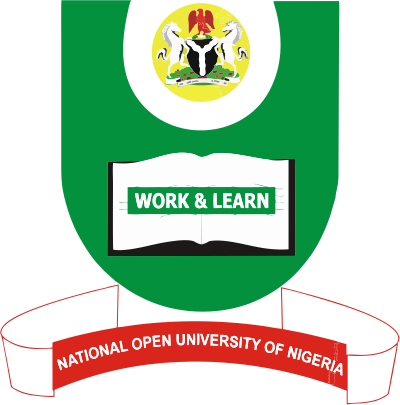How to login to NOUN Elearn Portal
You can now use you matric number to login as your username and password in a lowercase.
https://elearn.nouedu2.net/login/
Note that you are to change your passw...
ABSTRACT
The 2009 crisis in the Nigerian banking system prompted a more robust and rigorous regulatory regime, with particular attention on enhancing the quality of banks and establishing financial stability. To this end, the regulator of banks in Nigeria implemented policies and pronouncements in line with economic realities and global events. In recent years, the performance of most banks has dwindled and the bank managers’ main excuse for poor performance has been regulatory headwinds.
There is no consensus on the impact of regulatory shocks – Capital Adequacy Ratio, Liquidity Ratio and Cash Reserve Requirement – on bank performance (profitability and shareholders value). The research by earlier authors is inconclusive on the nature of relationship between regulatory shocks and performance. This study looks to re-evaluate the relationship between these variables and to understand/ explore strategy development for managing regulatory shocks in Nigerian commercial banks.
My main findings can be summarized as follows:
INTRODUCTION
There is the general notion that regulatory shocks significantly impact the ability of managers of financial institutions to generate adequate returns for their shareholders.The managers of financial institutions in Nigeria also share this sentiment as evident by the constant reference to regulatory headwinds as a reason for poor or dwindling performance. In recent years, the number of managers that ascribed regulatory shocks to poor results has increased.The key question is whether this is just a case of managers taking advantage of the regulatory environment by using it as excuse for lackluster performance, or indeed regulatory shocks do severely impact profitability.
As we are all aware, the Central Bank of Nigeria further tightened the regulation and supervision of financial institutions in Nigeria, in the wake of the 2008 crisis in the country. Despite the stricter regulatory framework and the volatility in regulatory pronouncements, the impact – as measured by profitability and return to shareholders – has varied considerably from institution to institution. Some financial institutions post superlative results while other post mediocre results. One would have expected that all financial institutions post great results in the times of favourable regulatory pronouncements and vice versa.
However, the performance of the financial institutions over the past 5 to 7 years is at variance from the general expectation (notion) earlier asserted. The disconnect between perceived impacts and actual impacts prompts this research work. To scope this research, the regulatory pronouncement by the Central Bank of Nigeria from 2010 to date were reviewed
Select NOUN Past Questions & Answers by Faculties
National Open University of Nigeria (NOUN) Faculty of Sciences Past Questions and Answers.
National Open University of Nigeria (NOUN) Faculty of Education Past Questions and Answers.
National Open University of Nigeria (NOUN) Faculty of Arts and Social Sciences Past Questions and Answers.
National Open University of Nigeria (NOUN) Faculty of Law Past Questions and Answers.
National Open University of Nigeria (NOUN) Faculty of Management Sciences Past Questions and Answers.
National Open University of Nigeria (NOUN) Faculty of Health Sciences Past Questions and Answers.
National Open University of Nigeria (NOUN) Faculty of Agricultural Sciences Past Questions and Answers.
Select Project Topics & Materials by Categories
Universities, Polytechnic's and Colleges of Education Accounting Project Topics and Materials.
Universities, Polytechnic's and Colleges of Education Biology Project Topics and Materials.
Universities, Polytechnic's and Colleges of Education Business Education Project Topics and Materials.
Universities, Polytechnic's and Colleges of Education Chemistry Project Topics and Materials.
Universities, Polytechnic's and Colleges of Education Computer Science Project Topics and Materials.
Universities, Polytechnic's and Colleges of Education Criminology & Security Project Topics and Materials.
Universities, Polytechnic's and Colleges of Education Economics Project Topics and Materials.
Universities, Polytechnic's and Colleges of Education Education Project Topics and Materials.
Universities, Polytechnic's and Colleges of Education English/Linguistic Project Topics and Materials.
Universities, Polytechnic's and Colleges of Education Entrepreneurship Project Topics and Materials.
Universities, Polytechnic's and Colleges of Education Environmental Science Project Topics and Materials.
Universities, Polytechnic's and Colleges of Education Law Project Topics and Materials.
Universities, Polytechnic's and Colleges of Education Marketing Project Topics and Materials.
Universities, Polytechnic's and Colleges of Education Physics Project Topics and Materials.
Universities, Polytechnic's and Colleges of Education Political Science Project Topics and Materials.
Universities, Polytechnic's and Colleges of Education Public Administration Project Topics and Materials.
You can now use you matric number to login as your username and password in a lowercase.
https://elearn.nouedu2.net/login/
Note that you are to change your passw...
The Flemish Ministry of Education and Training awards scholarships to highly talented international students who want to study a master's programme at a Flemish university, a school of arts or ...
Universities of the Coimbra Group offer short-term visits (generally 1 to maximum 3 months) to young African researchers from higher education institutions from Sub-Saharan Africa. The main aim of ...





